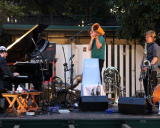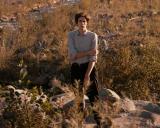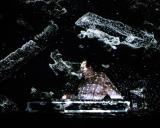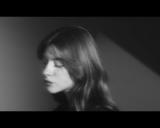Music
February 22, 2016
Food for thought: music by AKKU
Rosanna Forte
Music is everywhere in South Tyrol. Even today, music plays a very important part in upholding regional tradition and you can scarcely go to a Traubenfest or a Dorffest without encountering some centuries old village brass band, kitted out in their own particular variation of lederhosen and waistcoats. But it’s not all Kapelle groups, and men with felt hats and trombones. franz talked to AKKU, the electro band from Laives, to find out about a completely new sound in South Tyrol’s music scene.
Roger Toso (voices, synth), Daniele Alessi (programming, synth), Mirco Andreolli (drums), Daniele Bottin (programming) and Gabriele Stegher (synths, guitar) are the 5 musicians who make up AKKU, the live electronic band who are making a name for themselves in Bolzano and the surrounding area. These five men certainly don’t have a great deal of time on their hands – 2 are doctors whilst ohter 2 are engineers. But all their free time is devoted to their music, and the proof is in the pudding. Akku, the band’s first EP, was released in 2015. I met Roger and Gabriele to find out a bit more about the ideas behind AKKU, the process of song-writing and the power of music in today’s society.
You describe yourselves on your Facebook page as a group which combines all the various influences and ideas of its members. Are there groups which have had a particular influence on you?
Gabriele: Well there are several – Moderat, Tyquan, Apparat. What we do is unite these sounds with the live aspect. We take certain components of electro music and combine it with live singing and drumming. Lots of electro artists do little bits live but we try to play as much live as possible. That’s more us. We love the act of playing together, creating something in that space. We play electro but in our own particular way.
Most professional musicians began playing as children. What about you? Has music always been a big part of your lives?
Gabriele: For me yes, there has always been music in my life. I began with the piano when I was a kid, and from there I learned the guitar. Then I did all the usual things – I played with bands, began writing my own stuff and it all took off from there really. You could say I’ve done the whole range – from Mozart, to acoustic to electro.
Roger: For me it was a bit different. I didn’t actually start playing till I was 20, which is comparatively late in the music world. I had already been singing before but then I had friends who were playing and I got really into it through them. So music started out as a social thing but then gradually it developed into a need to express myself, to write my own stuff.
It’s a big controversy in the Pop industry that so few stars write their own music. When did you start writing your own songs?
Gabriele: In my opinion it’s something you do naturally at a certain point. Once you understand how an instrument works, eventually you want to be able to create something of your own with it. It’s a natural part of being a musician. So what’s it like to be a musician here in South Tyrol? Obviously this is an area with a huge musical tradition, but when you think of music in South Tyrol you think about the Kapelle bands and the Dorfbands. Do you feel you were encouraged to break away and do something different?
Gabriele: It’s a good question. We definitely felt the need to do something we liked and found stimulating. And so far I have to say the feedback has been good. Our audience like what we do, and our music seems to be rather catchy. We saw that what we were doing was well-received and that gave us the encouragement to carry on from there. But obviously we don’t play just to please other people. If you play only for that, it defeats the point of music in my opinion. We play what we like, and if others like it too then so much the better.
Roger: As for South Tyrol as a music scene, there are some fantastic offerings and lots of groups have emerged over the last few years. There aren’t a great many others who do exactly what we do. That’s not to say they don’t exist but there aren’t many of them. There are, however, some bands who are moving towards electronic music. And that’s great – it’s wonderful to meet people doing similar things to you. It’s a great opportunity for exchanging ideas.
Gabriele: Exactly. Electro music is such a huge genre, it’s possible to do it in so many different ways. So it’s really good to be able to compare what you’re doing with what other people are doing. Particularly from a technical point of view. It’s really stimulating in that respect, perhaps even more so than musically.
What’s striking about your music is that almost all your songs are written in English. What made you take that decision?
Roger: For one thing, the English language suits our style of music better. It fits with the Electro sound, phonetically as well as culturally. Electronic music has a particular rhythm, a particular movement which is better suited to English than to Italian. There are Electro groups who write their songs in Italian, but for us English is more in line with the sound we’re looking to create. The other thing of course, is that it’s the international language and therefore can represent all cultures.
Gabriele: Exactly. It means it’s open and inclusive. We’re not limiting our music to a particular audience.
It must be very difficult to write songs in another language. Can you talk us through your process?
Roger: We begin with a certain concept which we want to express. Then together we exchange ideas and try to develop the lyrics from there. We never ever write a text in Italian and translate it into English, it’s just not doable. It would change everything – the sound, the rhythm, the mood. So we talk about ideas in general and then go from there. And it’s not simply about translating, of course we have to choose words which are correct in English, but it’s more than that. It’s about which words sound right, which words really capture the mood that we’re trying to capture.
And do you have a particular mood you’re trying to capture?
Gabriele: It depends a lot on the song. I mean, we can say for sure our music isn’t ‘super happy’, it’s not ‘summer-feeling’ stuff. But yes, I’d say it depends on the piece. Our songs capture various states of mind.
And what about the first song on your album, “Bad Guy”. What’s the mood of that?
Roger: Bad Guy recounts a particular situation. It’s not in any way autobiographical, instead it tries to photograph a specific type of person, a condition of having experienced lots of difficulties in life. It’s about arriving at a certain point, where you accept the idea of being the bad guy. It’s also about decisions – choosing one road over another.
And what about the name, AKKU. How did that come about?
Roger: It happened kind of by accident. The whole process of finding a name was really difficult. In the end it was suggested by the drummer. And we liked it straight away. It has an impact, it’s direct. And obviously it has a link to electronic music. It’s simple. It works.
Recently you played at the opening of the Refugees Welcome Day. Is that an issue that’s important to you?
Gabriele: Yes absolutely. A musical event was a great idea to welcome refugees, not at least because it’s not dependent on the language someone speaks. Everyone could engage with the music and enjoy the evening. Sadly people don’t talk enough about this topic, or when they do it’s in a disparaging way. But it was great to see so many people there and from different backgrounds, doing different things, coming together to support this event. Yes, because art has always played an active role, both socially and politically. Since the dawn of time art has found a way of commenting on political and social events. Do you still think modern music plays this role?
Roger: Of course it depends on the artist, on what he’s looking to say. Some write as a provocation, others want to give food for thought about a certain topic.
Gabriele: Music is very capable of creating a strong message, because it remains with you. People remember the music, remember the words. Hence it’s an incredibly powerful vehicle. Music is at its best when it’s enjoyable, but goes beyond that. When it gets to the crux of matters.
What about AKKU? Would you regard yourselves as a political band?
Roger: I think that there are messages behind what we write definitely. Our songs are definitely food for thought. We would like that someone who listens to our music could then begin to question certain things. But it’s not the case that everyone who listens to music necessarily wants to receive that message.
Gabriele: All of our songs are based on narratives, on experiences. They are seeking to express moments, rather than a concrete political message. But that doesn’t mean that they don’t have a message to express and that they can’t be stimulating for the listener who wants to have that experience from music.
Let’s talk about your latest music video, Sleepwalker. The video is really interesting – black and white play an extremely prominent role. One immediately thinks of black and white in the racial sense, was that your intention?
Gabriele: All the visuals for our music are collaborative projects with two guys whose work we really like. So we work together. But in this case it was rather their vision than ours. It’s their interpretation of our song.
Roger: We worked together, we exchanged ideas about what we wanted whilst the work was taking form. But then at the end we left it up to them because we have great respect for them as artists and we share their aesthetics and their vision.
Gabriele: In this case black and white is more aesthetic than political. But black and white is important. We’re interested in shades, in shadow and in absence of colour. And of course it’s relevant to the scene of electronic music. Dark clubs with bright lights.
Is clubbing the kind of experience you want to create for your listeners in concert?
Roger: Actually in a way yes. When we play in concert, we don’t particularly want that we’re the focus of attention. Rather we provide the background for the experience of each individual. We don’t want this separation between the band and the audience. We want to include people in our performance, so each individual can interpret the music in their own way and can live the evening and the music in their own way.
Gabriele: When bands perform live, the focus is always on them. In clubs, by contrast, the experience is much more nuanced. Individuals, the listener, are far more important. We want to create a synthesised experience. We don’t want to be the focus. Of course that’s not easy, there’s a lot of technique behind realising our vision.
Speaking of your vision, what is your vision for the future?
Gabriele: We’re looking to go ahead with what we’re doing. We’re writing new pieces and coming up with new ideas.
Roger: Writing music is the fundamental part of our project. And it’s a long process. First the ideas, then actually writing the music and the text. Then combining all this with the technical aspect and finally the visuals. It takes quite a bit of time.
Foto: AKKU, 2015, by Vincenzo Alessi


















Comments